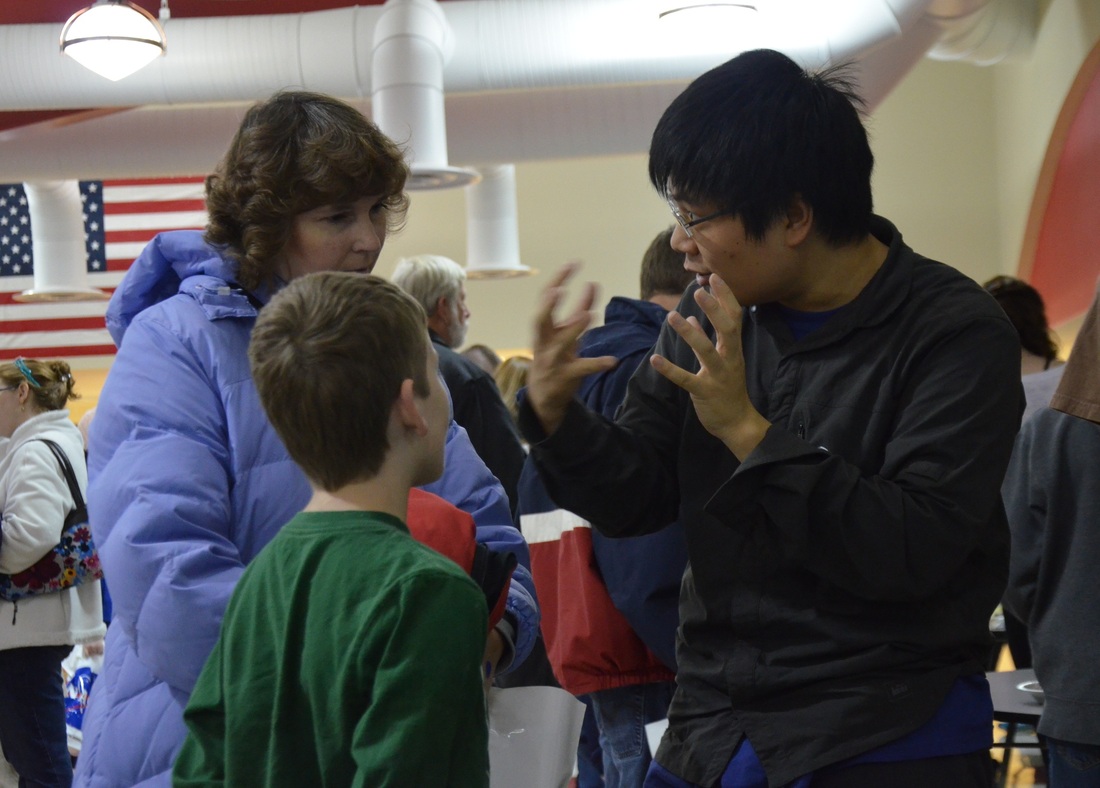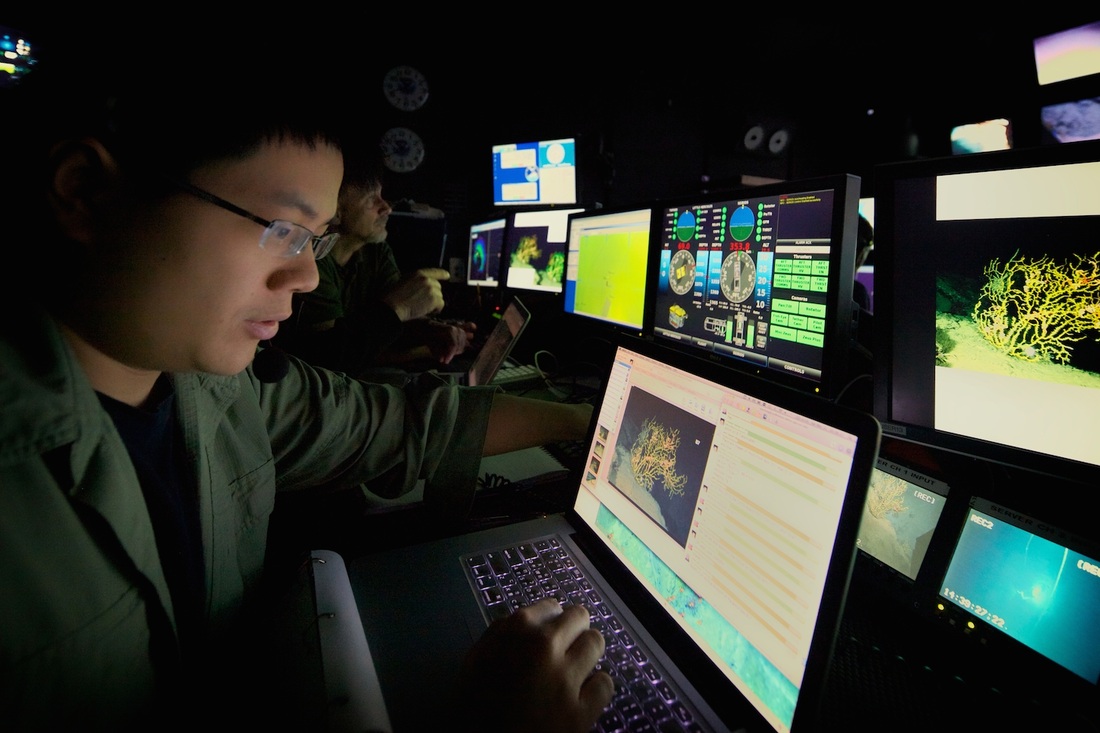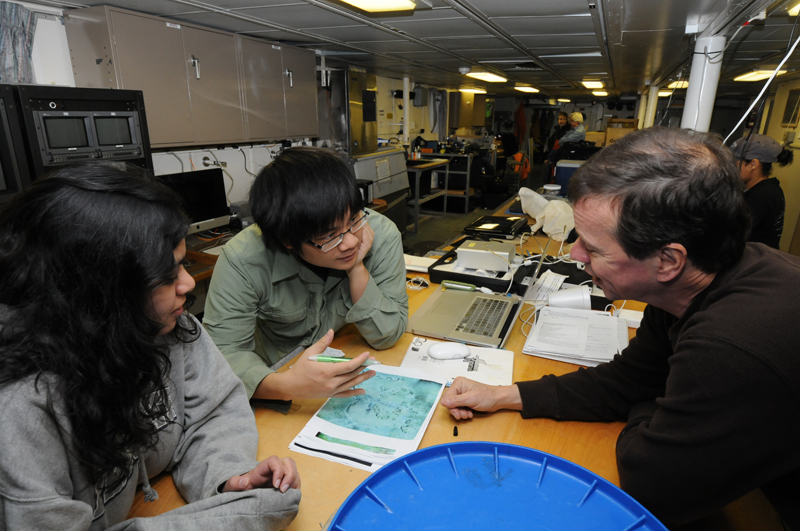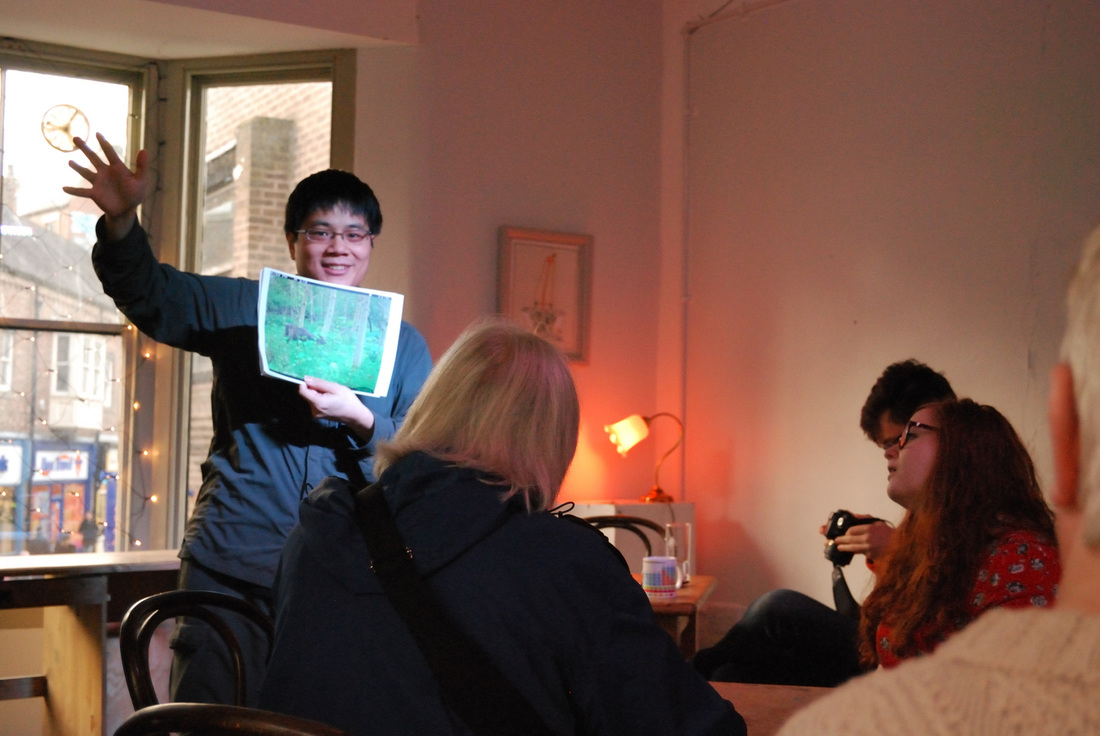
Pen-Yuan Hsing
In the broadest sense, I love listening to the wondrous stories nature shares with us, using science as the language. With my interest in ecology and conservation (and travel), this love has led me across the world. Whether it is surmounting a cliff to reach an owl's nest in South Africa; running transects in the tropical rainforests of Costa Rica; directing the collection of specimen from deep-sea hydrothermal vents near Papua New Guinea; or measuring leatherback sea turtle nest temperatures in Trinidad, I am ultimately interested in doing ecological research that may inform conservation efforts. An example would be the research I took part in for my MS degree: Studying the impacts from the 2010 Deepwater Horizon oil spill to deep-sea coral communities in the Gulf of Mexico. I am also interested in the human aspect of conservation work, and the tools with which we do it. My current research focuses on (1) utilising the latest advances in camera trap technology to develop and deploy a wild mammal monitoring network in the UK, and (2) crowdsourcing the camera trapping effort in collaboration with the Durham Wildlife Trust as a form of citizen science. What we achieved so far is MammalWeb, a citizen science web platform where volunteers across north east England have contributed camera trap photos and collaboratively classified them. Here are some recent results, and we have partners helping to take MammalWeb to the next level. Position: PhD Student in the Department of Biosciences
Supervised by: Dr. Philip Stephens, Prof. Stephen G. Willis, Prof. Mark Whittingham, Dr. Steven Bradley, Dr. Russell Hill, Dr. Vivient Kent Membership: Behaviour, Ecology and Evolution Research (BEER) Centre, Contact Details: Department of Biosciences, Durham University, South Road, Durham, DH1 3LE. Email: [email protected] Education
2014-present PhD Biology, Durham University, United Kingdom 2010-2013 MS Biology, The Pennsylvania State University, United States 2006-2010 BS Environmental Science and Biology, Duke University, United States |
Publications
Fisher, C. R., Hsing, P.-Y., Kaiser, C. L., Yoerger, D. R., Roberts, H. H., Shedd, W. W., … Brooks, J. M. (2014). Footprint of Deepwater Horizon blowout impact to deep-water coral communities. Proceedings of the National Academy of Sciences, 111(32), 11744–11749. doi:10.1073/pnas.1403492111
Hsing, P.-Y., Fu, B., Larcom, E. A., Berlet, S. P., Shank, T. M., Govindarajan, A. F., … Fisher, C. R. (2013). Evidence of lasting impact of the Deepwater Horizon oil spill on a deep Gulf of Mexico coral community. Elementa: Science of the Anthropocene, 1, 0000012. doi:10.12952/journal.elementa.0000012
White, H. K., Hsing, P.-Y., Cho, W., Shank, T. M., Cordes, E. E., Quattrini, A. M., … Fisher, C. R. (2012). Impact of the Deepwater Horizon oil spill on a deep-water coral community in the Gulf of Mexico. Proceedings of the National Academy of Sciences, 109(50), 20303–20308. doi:10.1073/pnas.1118029109
Schultz, T. F., Hsing, P.-Y., Eng, A., Zelnio, K. A., Thaler, A. D., Carlsson, J., & Dover, C. L. (2010). Characterization of 18 polymorphic microsatellite loci from Bathymodiolus manusensis (Bivalvia, Mytilidae) from deep-sea hydrothermal vents. Conservation Genetics Resources, 2. doi:10.1007/s12686-010-9272-8
Fisher, C. R., Hsing, P.-Y., Kaiser, C. L., Yoerger, D. R., Roberts, H. H., Shedd, W. W., … Brooks, J. M. (2014). Footprint of Deepwater Horizon blowout impact to deep-water coral communities. Proceedings of the National Academy of Sciences, 111(32), 11744–11749. doi:10.1073/pnas.1403492111
Hsing, P.-Y., Fu, B., Larcom, E. A., Berlet, S. P., Shank, T. M., Govindarajan, A. F., … Fisher, C. R. (2013). Evidence of lasting impact of the Deepwater Horizon oil spill on a deep Gulf of Mexico coral community. Elementa: Science of the Anthropocene, 1, 0000012. doi:10.12952/journal.elementa.0000012
White, H. K., Hsing, P.-Y., Cho, W., Shank, T. M., Cordes, E. E., Quattrini, A. M., … Fisher, C. R. (2012). Impact of the Deepwater Horizon oil spill on a deep-water coral community in the Gulf of Mexico. Proceedings of the National Academy of Sciences, 109(50), 20303–20308. doi:10.1073/pnas.1118029109
Schultz, T. F., Hsing, P.-Y., Eng, A., Zelnio, K. A., Thaler, A. D., Carlsson, J., & Dover, C. L. (2010). Characterization of 18 polymorphic microsatellite loci from Bathymodiolus manusensis (Bivalvia, Mytilidae) from deep-sea hydrothermal vents. Conservation Genetics Resources, 2. doi:10.1007/s12686-010-9272-8
Presentations
Hsing, P.-Y. “Deep corals in the Gulf of Mexico and the use of high resolution imaging to track oil spill impact”. Invited talk at the Department of Biology, Long Island University Post, Long Island, New York, United States. (27 March 2013)
Hsing, P.-Y., Fu, B., Larcom, E., Lukasiewicz, A., Shea, K., & Fisher, C. R. “Tracking and modelling Deepwater Horizon disaster impact on deep coral communities”. Talk presented at the Student Conference on Conservation Science, New York, New York, United States. (10 October 2012)
Forrester, K., Hall, E., Hsing, P-Y., Williams, S., “Teaching Sustainable Management of Mopane Trees to Grade 10 Learners through the Scientific Method”. Talk presented at the 2009 Annual SAEON Teachers’ Conference, Blyde River Canyon, South Africa. (21 February 2009)
Hsing, P.-Y. “Deep corals in the Gulf of Mexico and the use of high resolution imaging to track oil spill impact”. Invited talk at the Department of Biology, Long Island University Post, Long Island, New York, United States. (27 March 2013)
Hsing, P.-Y., Fu, B., Larcom, E., Lukasiewicz, A., Shea, K., & Fisher, C. R. “Tracking and modelling Deepwater Horizon disaster impact on deep coral communities”. Talk presented at the Student Conference on Conservation Science, New York, New York, United States. (10 October 2012)
Forrester, K., Hall, E., Hsing, P-Y., Williams, S., “Teaching Sustainable Management of Mopane Trees to Grade 10 Learners through the Scientific Method”. Talk presented at the 2009 Annual SAEON Teachers’ Conference, Blyde River Canyon, South Africa. (21 February 2009)
Selected Awards and Fellowships
Durham Doctoral Scholarship, Durham University, 2014
Best Talk award at the Student Conference on Conservation Science in New York (SCCS-NY), 2012
Excellence in Partnering Award from the U.S. National Oceanographic Partnership Program, 2011
Braddock Scholarship, The Pennsylvania State University, 2010
Rachel Carson Research Scholar, Duke University, 2009
Awarded with a named Main-belt asteroid “21633 Hsingpenyuan (1999 NW11)” by the Massachusetts Institute of Technology Lincoln Laboratory, 2005
Durham Doctoral Scholarship, Durham University, 2014
Best Talk award at the Student Conference on Conservation Science in New York (SCCS-NY), 2012
Excellence in Partnering Award from the U.S. National Oceanographic Partnership Program, 2011
Braddock Scholarship, The Pennsylvania State University, 2010
Rachel Carson Research Scholar, Duke University, 2009
Awarded with a named Main-belt asteroid “21633 Hsingpenyuan (1999 NW11)” by the Massachusetts Institute of Technology Lincoln Laboratory, 2005




